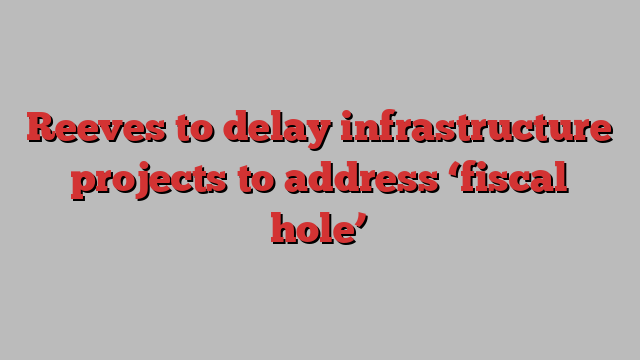
Unlock the Editor’s Digest for free
Roula Khalaf, Editor of the FT, selects her favourite stories in this weekly newsletter.
Rachel Reeves is set to officially delay a raft of “unfunded” road and hospital schemes as the chancellor seeks to fill an estimated £20bn fiscal hole she claims was bequeathed by the last Conservative government.
As well as highlighting problems in areas such as prisons and the asylum system, government officials said Reeves will on Monday argue she has inherited capital projects that are “unfunded with unfeasible timelines”.
Reeves’s problems have been exacerbated by recommendations from independent pay review bodies that public sector workers should get pay rises of some 5.5 per cent in 2024/25, well above inflation at 2 per cent.
Her allies said she is “likely” on Monday to meet the recommendations in full. The Labour chancellor has warned of the “costs” of not doing so in terms of industrial strife and problems with recruitment and retention.
Applied across the public sector, that could cost around £8bn a year more than the Treasury had planned. The bill will contribute to a fiscal hole of around £20bn, according to Whitehall officials who cautioned the number had not been finalised.
Reeves’s “audit” of Labour’s spending inheritance has been attacked by Conservatives as a charade, which they claim is an attempt to provide political cover for tax rises that Reeves had planned all along.
In a statement to MPs on Monday Reeves will attempt to lodge in voters’ minds the idea that former Tory prime minister Rishi Sunak’s government left behind a public realm built on sand and unbelievable promises.
Key road projects that have spent years in planning may be at risk as higher inflation has sent cost estimates soaring, Labour figures said. “Many of these schemes are unfunded,” said one.
Prime Minister Sir Keir Starmer has refused to commit to a new £1.7bn tunnel under the Stonehenge monument on the A303, although a final decision may not come until a ruling on the project by the Court of Appeal in the early Autumn.
The Lower Thames Crossing, a 14 mile road and tunnel east of London that is projected to cost £9bn, is also under threat after a decision on its future was delayed by six months because of the general election.
Elsewhere, health secretary Wes Streeting is set to “reprofile” the Conservatives’ flagship New Hospital Programme, under which 40 hospitals on the NHS’s crumbling estate were to be built or expanded.
Streeting told MPs this week it was “painfully clear” that the programme was not deliverable by 2030, as resources are sucked into fixing existing hospitals made of crumbling concrete.
He said: “I want to see the New Hospital Programme completed, but I am not prepared to offer people false hope about how soon they will benefit from the facilities they deserve.”
Officially delaying big capital projects will be awkward for Reeves and Starmer, who have promised to unleash a building boom, but the chancellor has also insisted that all public spending must be paid for.
Jeremy Hunt, shadow chancellor, told the Financial Times Reeves is looking for an excuse to raise taxes in her Autumn Budget, the date of which she will also reveal on Monday.
“With welfare reform, productivity and pay restraint it is perfectly possible to balance the books and even continue to reduce certain taxes,” he said.
But economists said that the lingering effects of high inflation and pressures on services like prisons, the NHS, defence and asylum have combined to present the new chancellor with an immediate headache.
“This year was always going to be crunch year,” said Ben Zaranko at the Institute for Fiscal Studies, noting that 2024-25 is the final fiscal year of the spending review laid out by Sunak when he was chancellor in 2021.
The outlays under that settlement were heavily front-loaded, and high inflation eroded about £15bn from the real-terms value of this year’s public services budgets relative to what was planned in 2021, he explained.
Further budget problems stem from issues such as the need to accommodate asylum seekers and the cost of the now-scrapped Rwanda scheme, which home secretary Yvette Cooper this week put at £700mn.
The Home Office budget was effectively frozen overall in cash terms between 2023-24 and 2024-25 under the 2021 spending review, leaving little margin for unexpected overruns.
Meanwhile the Department for Transport capital budget was programmed to rise by just 0.6 per cent a year in real terms from 2021-22 to 2024-25. “You can get quite a big number quite easily,” said Zaranko, speaking of the departmental overruns.
The Treasury declined to comment.